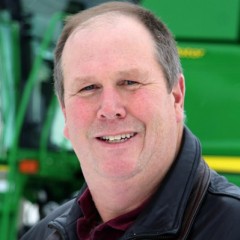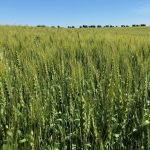This fall a salesman for a soil amendment product told me that if I used his product, I would be more successful. When I asked him if anyone around was using the product, he replied: “Some of the most successful farmers use it.”
In past, salespeople have often told me that using their products will result in higher yields. I have also been promised increased productivity, efficiency, and/or profitability if I would only purchase their products, whether they were selling anything from new seed varieties to chemicals, fertilizers, biologicals or even equipment.
Read Also

Farm & Family – Feb 27 edition
Last week, we highlighted part one of a two-part series by GFM associate digital editor Geralyn Wichers about why you…
However, here was a salesman promising to improve not only my yields but my “success” with the use of his product. I suppose this sales tactic made a lot of sense to him. After all, what farmer doesn’t want to be successful? But ever since that meeting I have pondered one question: What is success?
I have no doubt that most people equate success to wealth, power, or achievement, all of which often go hand in hand. Society seems to reserve its highest esteem for those who amass a fortune, no matter how the money is earned. Presidents, prime ministers and government leaders around the world, whether respected or despised, are typically seen as successful people. Today’s heroes are the highest paid athletes and actors.
But are these the criteria by which truly successful people measure their own lives?
In their own words
Last spring Business Insider, which bills itself as the largest business news site on the web, published “12 Rich, Powerful People Share Their Surprising Definitions of Success” (Shana Lebowitz, Mar. 22, 2017). None of the 12 featured in the article defined their success by accumulated wealth or power.
Business Insider revealed that billionaire Sir Richard Branson, founder of the Virgin Group, wrote on LinkedIn: “Too many people measure how successful they are by how much money they make or the people that they associate with,” he said. “In my opinion, true success should be measured by how happy you are.”
Billionaire businessman John Paul DeJoria told Business Insider: “Success isn’t how much money you have. Success is not what your position is. Success is how well you do what you do when nobody else is looking.”
Former U.S. poet laureate Maya Angelou defined success as “liking yourself, liking what you do, and liking how you do it.”
“Success is one per cent inspiration and 99 per cent perspiration,” claimed inventor Thomas Edison.
Harvard Business Review also tried to find the definition of success by compiling the results of more than 80 surveys and 4,000 interviews conducted by Harvard Business School students over a five-year time period. Boris Groysberg, a professor of business administration at Harvard Business School wrote: “Subjective factors such as making a difference and working with a good team in a good environment came up frequently in leaders’ definitions of career success. And rewarding relationships were by far the most common element of personal success.” (What Does Success Mean to You? February 25, 2014)
Success in farming
If asked to make of list of individuals you consider to be very successful, how many farmers would be on your list?
And what criteria would a farmer have to meet to get on that list? Number of acres? Growth of the business? Age of equipment? Weed-free fields?
Unfortunately, success in farming is now almost totally defined by production and marketing.
Universities, ag extension agencies, banks, accountants, ag advisers and even a growing number of input providers offer information, advice and worksheets aimed at helping you monitor your production, financial status, business management, and overall farm performance.
We have become so focused on financial aspects of farming, many farmers no longer consider the personal side of their business. They ignore the subjective reasons that were important when they decided on a career in farming, such as the opportunity to work independently, to manage their own business, to make their own decisions, to have greater time with family, and to be part of a community.
The Florida A&M University worksheet “On the Road to Successful Farming: The Decision-Making Process” provides the following definition for farm success:
What is success?
- Success is a favourable accomplishment, an attainment, an issue, or an outcome.
What makes a successful farmer?
- If success is measured in terms of profitability, successful farming is determined by the farmer’s ability to manage his or her operation efficiently.
- Successful farmers conduct their business operation economically.
- This means that they use whatever resources are available and make them go as far as possible toward achieving the farm’s goals.
The worksheet then details the common, step-by-step decision-making process:
Decision-making steps for successful farming
- Setting goals
- Recognizing the problem
- Obtaining information
- Considering alternatives
- Making the decision
- Taking action
- Accepting responsibility
- Evaluating the decision
Unfortunately, there are two problems with this process. First, nowhere in the decision-making process is success actually defined. It assumes achieving your goals and success are the same thing. This is not necessarily the case.
As I pointed out at the beginning of this article, even the most successful business leaders did not judge their success solely on business goals or measureable achievement. There are subjective criteria, such as happiness, that will factor into a quest for success. And since the definition of success, like goals, will be different for each person, unless you define what success means to you there is no way you can achieve it.
In fact, defining success should be the first step in the decision-making process. Unless you are honest about what you consider success to be, how can you possibly set goals that will enable you to achieve the measure of success you seek?
Second, this process casts success as the achievement of your goals. This differs from how most business leaders define success. Rather than the final outcome, truly successful people measure success on a daily basis. Successful people are those who love what they do every day.
If you do not define what success is to you, how can you identify a goal that will lead to a life that you consider to be successful? Are the goals you set and the decisions you make actually what you will find rewarding on the everyday journey towards achieving the goal?
Are you chasing a dream, or living a dream? Will what you have to do each day in the quest of the goal bring you happiness? Are your goals a path to the success you seek, or are the goals the result of the direction you are being pushed in by others, be they your partners, bankers, or even suppliers.
Peter Clemens, founder and editor of Possibility Change, a web blog featuring personal success stories, found “many people feel trapped in the life they are leading, unable to change course. They feel frustrated, lonely, stressed, discouraged, unfulfilled or just simply bored.”
We all know farmers who feel this way too. No matter how big they grow their farm, or how much wealth they acquire, they will never find success in the same way as someone who truly loves farming.
Perhaps the best advice comes from John Maxwell, author of more than 100 books and a leadership trainer whose company has led more than 15,000 clients to success. His basic philosophy is simply: KNOW, GROW, and SOW.
- KNOW what you love to do.
- GROW to your maximum potential.
- SOW seeds in others, so that they can also be successful.
By the way, I did not purchase the soil amendment. I decided it simply would not make me more successful. But it certainly did make me think about what does. So, what makes you successful?
















